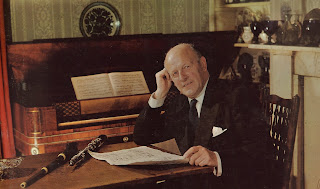 |
| Anna Linde |
Bach: Harpsichord Concerto No. 7 in G Minor, BWV 1058
Anna Linde, harpsichord, with string orchestra
Recorded October 8, 1928
English Parlophone E 10879 and E 10880, two 78-rpm records
Link (FLAC file, 40.39 MB)
Link (MP3 file, 22.71 MB)
According to Christian Zwerg's Parlophon discography, the orchestra is that of the Berlin State Opera, and the conductor was Frieder Weissmann, Parlophon's house conductor. And the irony is that, although Weissmann's name is not on the labels, we know far more about his career than we do about the harpsichordist's, for Anna Linde is a figure shrouded in mystery. Here is what we have been able to find out about her (and I am indebted to Nick Morgan and his great sleuthing powers for this information):
She was born Johanna Anna Pincus in Bromberg, Germany (now Bydgoszcz, Poland), in 1880. During the 1910s she studied with Wanda Landowska at the Berlin Hochschule für Musik, and sometime after this adopted "Anna Linde" as her professional name. In the late 1920s she recorded a handful of sides for Parlophon, among them several with Paul Grümmer playing the viola da gamba (these can be heard at the CHARM website, as can two of her solo sides). Being Jewish, when the Nazis came to power, she was forced to flee Germany, and she went first to Italy, where she made several recordings for the anthology "Musiche Antiche Italiane" (producers of this first recording of Monteverdi's "Orfeo"). After Italy became unsafe for Jews, she emigrated to the USA, took citizenship and appears to have settled in Denver, Colorado, dying there in 1968.
The picture above is the only one I have been able to find of her, and appears to derive from Parlophon publicity material; my apologies for its awful quality but it was little better in my source, which was a reproduction in Frank Andrews and Michael Smith's discography of English Parlophone's 12-inch "E" series, published by the City of London Phonograph and Gramophone Society.






















